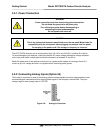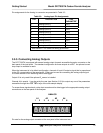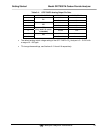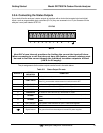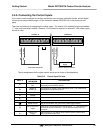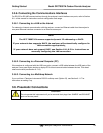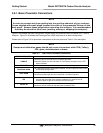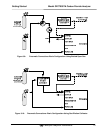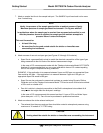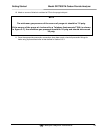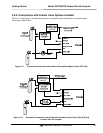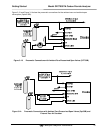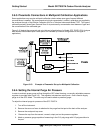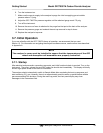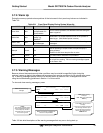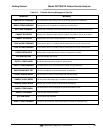
Getting Started Model GFC7000TA Carbon Dioxide Analyzer
Teledyne Analytical Instruments 28
7. Attach a sample inlet line to the sample inlet port. The SAMPLE input line should not be more
than 2 meters long.
NOTE
Ideally, the pressure of the sample gas should be at ambient pressure (0 psig).
Maximum pressure of sample gas should not exceed 1.5 in-Hg over ambient.
In applications where the sample gas is received from a pressurized manifold, a vent
must be placed as shown to equalize the sample gas with ambient atmospheric
pressure before it enters the analyzer.
This vent line must be:
At least 0.2m long
No more than 2m long and vented outside the shelter or immediate area
surrounding the instrument.
8. Attach sources of zero air and span gas (see Figures 3-3 through 3-8 inclusive).
Span Gas is a gas specifically mixed to match the chemical composition of the type of gas
being measured at near full scale of the desired measurement range.
In the case of CO
2
measurements made with the Teledyne Instruments Model GFC 7000TA
Analyzer it is recommended that you use a gas calibrated to have a CO
2
content equaling
80% of the range of compositions being measured.
EXAMPLE: If the application is to measure between 0 ppm and 500 ppm, an appropriate Span
Gas would be 400 ppm. If the application is to measure between 0 ppm and 100 ppm, an
appropriate Span Gas would be 80 ppm.
Span Gas can be purchased in pressurized canisters or created using Dynamic Dilution
Calibrator such as the Teledyne Instruments Model T700 and a source of dried air scrubbed
of CO
2
such as a bottle of N
2
.
Zero Air is similar in chemical composition to the Earth’s atmosphere but scrubbed of all
components that might affect the analyzer’s readings.
In the case of CO
2
measurements this means less than 0.1 ppm of CO
2
and Water Vapor
(when dew point <-15˚C). Zero Air can be purchased in pressurized canisters.
9. Attach an exhaust line to the exhaust outlet port.
The exhaust from the pump and vent lines should be vented to atmospheric pressure using
maximum of 10 meters of ¼” PTEF tubing.
CAUTION
Venting should be outside the shelter or immediate area surrounding the instrument.



